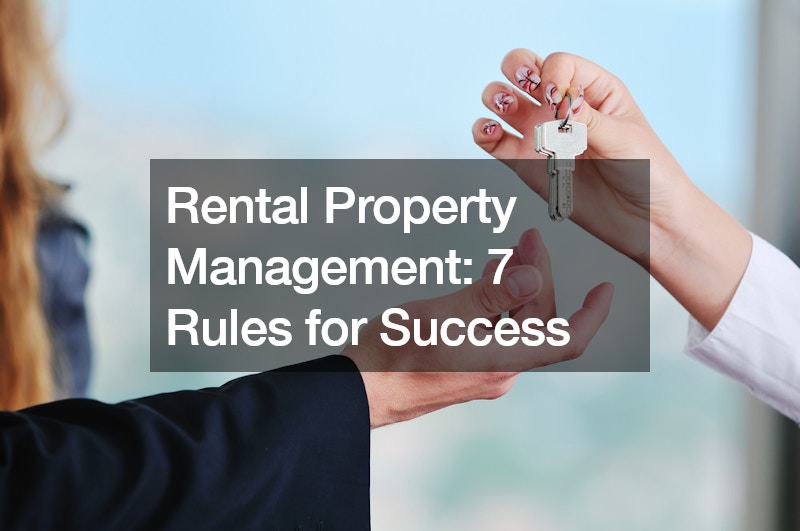Rental property management can be a lucrative venture when done right. Whether you’re a seasoned investor or just starting out, understanding the fundamental rules for success is crucial. In this blog post, we’ll explore seven essential rules that can help you effectively manage your rental properties and maximize your profits.
Rule #1: Treat It Like a Business, Not a Hobby
It’s easy to underestimate the complexity of managing rental properties, especially when starting out. However, treating your venture as a hobby can lead to serious pitfalls.
Adopting a business mindset is essential for long-term success. This means implementing efficient systems, staying organized, and prioritizing professionalism in all your dealings. Remember, even if you’re managing just one property, the principles of running a successful business still apply. By treating your rental property endeavors with the seriousness they deserve, you set yourself up for growth and profitability in the long run.
Rule #2: Offer Quality Properties
Investing in the quality of your rental properties is a direct investment in your success as a landlord. Tenants are more likely to pay higher rents and stay longer in well-maintained and attractive properties. Consider allocating a portion of your budget to regular maintenance and upgrades to keep your properties in top condition.
For example, you could invest in modernizing the kitchen or bathroom with updated fixtures and appliances, which are key areas that tenants often prioritize. Additionally, enhancing curb appeal through landscaping and exterior improvements can make a significant impact on attracting prospective tenants and commanding higher rental rates. By offering quality accommodations, you not only attract better tenants but also minimize the risk of costly repairs and vacancies in the future.
Rule #3: Cast a Wide Net When Attracting Tenants
In today’s competitive rental market, casting a wide net is crucial for finding the best tenants. Don’t limit yourself to traditional advertising methods; explore various channels to maximize exposure for your vacancies. Utilize online platforms, social media, and local community boards to reach a diverse pool of potential renters. The more visibility your property has, the higher the chances of finding qualified tenants who meet your criteria.
Rule #4: Screen Tenants Thoroughly
The importance of thorough tenant screening cannot be overstated. Rushing through this process or overlooking red flags can lead to significant headaches down the road. Take the time to verify potential tenants’ backgrounds, including their rental history, creditworthiness, and employment stability. While it may seem like extra work upfront, thorough screening can save you from the hassle of dealing with problematic tenants and costly evictions later on.
Rule #5: Adhere to Fair Housing Laws
Fair housing laws exist to ensure equal opportunity in housing for all individuals, regardless of race, religion, or other protected characteristics. Property managers hold the responsibility to understand and comply with these laws to avoid legal repercussions. Familiarize yourself with federal, state, and local fair housing regulations, and ensure that your rental practices are fair and non-discriminatory.
It’s also essential to stay informed about any updates or changes to fair housing laws to ensure ongoing compliance and uphold ethical standards in your property management practices. By treating all applicants equally and following the law, you create a welcoming and inclusive rental environment.
Rule #6: Use a Comprehensive Lease Agreement
A well-written lease agreement is a cornerstone of successful rental property management. It serves as a legal contract between you and your tenants, outlining rights, responsibilities, and expectations for both parties. Take the time to draft a comprehensive lease that covers all necessary provisions, including rent payments, maintenance procedures, and dispute resolution mechanisms.
Additionally, consider including clauses that address any unique aspects of your property or specific rules and regulations you want to enforce. Consulting with a legal professional can help ensure that your lease is legally sound and tailored to your specific needs.
Rule #7: Enforce Rules Consistently
Consistency is key when it comes to enforcing rules and policies with tenants. Establish clear guidelines for rent payments, property maintenance, and tenant conduct, and enforce them consistently for all tenants. Avoid making exceptions or bending the rules, as this can undermine your authority and lead to resentment among tenants. By maintaining firm but fair enforcement practices, you establish credibility and foster a positive landlord-tenant relationship based on mutual respect and accountability.
In conclusion, mastering rental property management requires adherence to a set of fundamental rules. By treating your rental properties as a business, offering quality properties, attracting tenants effectively, screening tenants thoroughly, adhering to fair housing laws, using comprehensive lease agreements, and enforcing rules consistently, you can set yourself up for success in the rental property market. Implement these rules in your property management strategy to maximize profitability and minimize risks.
.




